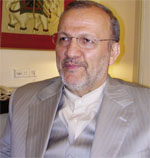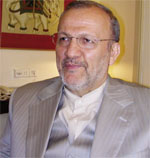
Iranian Foreign Minister Manoucher Mottaki to the Yemen Times:All Muslim and non-Muslim states should open their embassies in Iraq [Archives:2008/1146/Reportage]
April 14 2008
 |
sallammoh@yahoo.com
“Yemen and Iran are deliberating and exchanging viewpoints on bilateral, regional and international relations, Iranian Foreign Minister Manoucher Mottaki says, adding that his current visit to Yemen sought to discuss numerous issues, specifically those related to economic and development cooperation.
“We've had positive dialogue in Yemen, focusing on how to enhance bilateral relations between our two countries,” he maintains.
Mottaki, who arrived in Sana'a last Thursday and flew home Friday, said, “From the viewpoint of the Islamic Republic [of Iran], Yemen is an effective nation in the region. Yemen and Iran have formed a joint committee due to commence meetings in the coming months. Iran may adopt many projects in Yemen, particularly in electricity.”
He continued, “We stressed the necessity of implementing what has been agreed upon, mainly because Yemen and Iran enjoy good capacities and both states intend to embody their agreements and projects in reality.
“We talked with Yemen's Minister of Electricity and Energy, Mustafa Bahran, about possible means of resolving any pressing problems and removing obstacles hindering implementing a huge electricity project in Yemen under Iranian supervision. This project is projected to play a vital role in meeting Yemeni citizens' growing power demands,” the Iranian official went on to say, “Moreover, we agreed that trade chambers in both states should hold a joint focus group to strengthen communication between businesspersons and investors in both nations.”
Interviewed at the Taj Sheba Hotel, Mottaki pointed out that bilateral relations between Yemen and Iran must develop at different levels and spheres. “We are in urgent need of establishing good diplomatic representation and enhancing communication between the peoples of both nations,” he noted.
Mottaki stressed the necessity of media playing a notable role in fostering positive and transparent relations between both countries. “A crucial part of the good diplomatic representation we're planning to establish should be reflected in media activities and cooperation. We discussed this subject, as well as how to strengthen media communication between the peoples of Iran and Yemen,” he said.
“We agreed to work on improving the performance of media outlets in Yemen and Iran in order to be more capable to deal with developments in both nations and diagnose their positions on various regional and international issues,” he added.
“Yemen and Iran enjoy very good relations in economic and political areas, with such relations being based on common interests, traditions and history. We're trying to do our best for the sake of improving citizens' living standards in both countries,” he noted.
Regarding Iran's position on what's occurring in Iraq, Mottaki said, “Iran has clear positions on what's happening in various parts of the world. For example, it strongly opposes American dominance over small states, with the Iranian leadership's positions receiving support from peoples in the region.
“In our view, the U.S. administration is unjust and oppressive, as evidenced by its treatment of mainly Islamic nations. Westerners seek to wage a fierce attack against the Islamic community, which views their democracy as contravening our values and ideologies. The U.S. administration waged a military attack on Iraq without consulting the international community, with the Iraqi people opposing its ongoing occupation of Iraq up until now.”
He continued, “I can confirm that the U.S. is experiencing a dilemma after finding itself mired in a swamp of blood in Iraq. President George W. Bush's policies have failed in Iraq, as well as in other territories. We can see that these U.S. policies are facing strong opposition, even from within [from the American people themselves].”
According to Mottaki, under Bush, the U.S. administration has sought to hold others accountable for its mistakes, but “in my opinion, the era of American dominance in the region has come to an end and the American people will contribute to changing their government's current policies.”
The Iranian minister further maintains that foreign troops must be pulled out of Iraq, while Arabs and Muslims, as well as the international community, seriously should support the legitimate Iraqi government. Once all foreign troops leave Iraq, the legitimate Iraqi government must be exclusively in charge of running the nation.
“Because foreign companies such as Blackwater – which claims to have maintained security in Iraq – have committed the most flagrant crimes in that country, such firms must be put on trial and their operations in Iraq banned,” Mottaki said.
Additionally, “The various Muslim and non-Muslim countries should open their embassies in Iraq mainly because that nation's stability and security is key to enhancing the stability of the entire region. But in order to achieve this goal, we must support Iraq's government.”
Regarding the Palestinian cause, the minister stated, “We support unity between Hamas and Fatah and we back Yemen's initiative in this regard. There's an invisible conspiracy meant to serve the United States at the expense of establishing an independent Palestinian state, but this conspiracy must be revealed.”
He continued, “The Palestinian history of struggle and resistance and the brave Palestinian people affirm that it's impossible for anyone to bargain with or confiscate Palestinians' constitutional rights.”
Regarding Iran's nuclear program and American and Western concerns about it, Mottaki noted, “The U.S. administration should address the issues of its own people in order for us to judge whether it is capable or has the power to discuss issues related to other nations' nuclear dossiers.
“Those who have used the atomic bomb in the world and tested the third and fourth generation of nuclear weapons aren't entitled to advise the world to use such energy only for peaceful purposes. The U.S. administration has no right to express its views about other countries' peaceful nuclear activities.”
Additionally, he noted, “According to the laws and regulations of the International Atomic Energy Agency, Iran is entitled to possess nuclear technology for peaceful purposes and thanks to our strong will and determination, we'll continue our activities.”
The Iranian foreign minister visited Yemen at the invitation of his Yemeni counterpart, Abu Bakr Al-Qirbi, who received him at Sana'a International Airport. The two officials discussed numerous regional and international issues.
Mottaki also met with President Ali Abdullah Saleh.
In a statement to local media, the Iranian official highlighted the available facilities that may help develop cooperation between Tehran and Sana'a at varying levels.
Saleh briefed the same media outlets on regional and international developments, affirming his government's determination to enhance regional cooperation with Iran.
Additionally, Al-Qirbi told media personnel that there are malicious parties – whom he refused to name, but accused of opposing any good relations between Sana'a and Tehran.
The Iranian foreign minister has visited Sana'a twice within the past two years.
About Iran
The Islamic Republic of Iran (Jomhuri-ye Eslami-ye Iran) covers 636,300 square miles (1,648,000 square kilometres) in southwestern Asia. It is bounded on the north by Azerbaijan, Armenia, Turkmenistan, and the Caspian Sea, on the east by Pakistan and Afghanistan, on the south by the Persian Gulf and the Gulf of Oman, and on the west by Turkey and Iraq. Iran also controls about a dozen islands in the Persian Gulf. More than 30 percent of its 4,770-mile (7,680-kilometre) boundary is seacoast. The capital is Tehran (Teheran).
Among Middle Eastern countries, Iran is unique in many ways. Its official language, Farsi (Persian), is Indo-European. While Iran adopted a modified version of the Arabic alphabet, it refused to lose its separate identity after the establishment of the Arab Empire in the 7th century. From the beginning of the Islamic era there was strong support for the house of 'Ali, Muhammad's son-in-law. 'Ali's claim of succession to the Prophet was disputed by the Sunnite majority, but his supporters proclaimed him first imam of their party. The party came to be called Shi'ah (Shi'ism), from shi'at 'Ali, “party of 'Ali.” When conversion to Islam began, Shi'ism was adopted by many, even though it was considered heresy at the time. Despite persecution the Shi'ite branch continued to grow, and in the 16th century it became the official religion of Iran. The concept of divine or sacred kingship, which originated in Mesopotamia, was an integral part of pre-Islamic Persian political culture and persists in the beliefs of the Shi'ites, who hold that sovereignty evolves from God and is expressed through his spokesmen on earth.
Iran is the only country in the Middle East that uses the Islamic solar calendar, which originated before the beginning of the Persian Empire (550 BC). After the conversion of the vast majority of Iranians to Islam, the ancient Iranian calendar was adjusted to begin with the year of the Prophet Muhammad's immigration to Medina (the hijrah), equivalent to AD 622 in the Gregorian calendar. To convert from the Islamic solar calendar to the Gregorian, 621 or 622 years, depending on the time of year, are added to the Iranian year. (For example, the Iranian year 1361 began on March 21, 1982, and ended on March 20, 1983.) No-ruz (New Year's Day) falls on March 21, the vernal equinox. The Arabic lunar calendar is used for religious observances.
Iran has played an important role in the Middle East, as an imperial power and as a factor in rivalries between East and West. Its strategic position and its vast resources, including petroleum and natural gas, make it a nation to be reckoned with in the modern world.
Source: Iranian Cultural & Information center.
——
[archive-e:1146-v:18-y:2008-d:2008-04-14-p:report]


